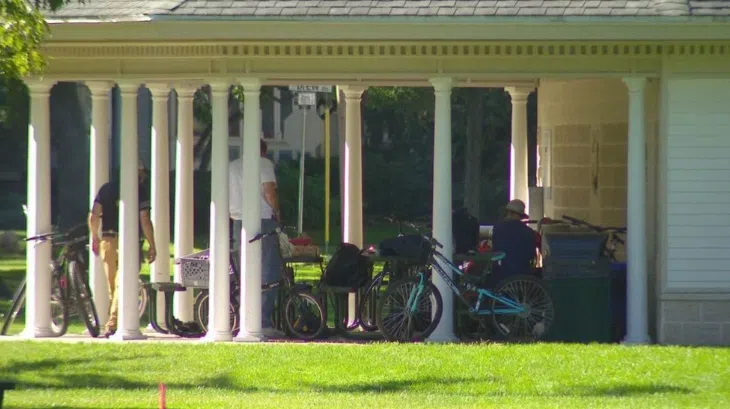
Unhoused community members in Appleton's City Park gazebo. PC: Fox 11 Online
APPLETON, WI (WTAQ-WLUK) — Over the last few years, the city of Appleton has seen a jump in people struggling with homelessness.
“Empirically, the numbers are increasing,” says Appleton Mayor Jake Woodford.
“In the 7 years I’ve been in my position, we’ve seen a huge increase in the homeless population, unhoused specifically,” says Kristal Knudtson with the Fox Cities Salvation Army.
“We’ve seen an increase in homelessness among families, we’ve seen an increase in homelessness among people over the age 60, 62. It’s on the rise around the country, it’s on the rise here,” adds Lisa Strandberg, the executive director of Pillars, an adult and family shelter in Appleton.
This summer, the U.S. Supreme Court made its biggest ruling on the issue of homelessness in decades. The 6-3 decision gives local municipalities the power to fine people and ban them from sleeping or camping in public places.
Appleton Mayor jake Woodford says the ruling is not a solution to homelessness.
“It might be a tool for some communities, and look, different communities are dealing with different issues, very different circumstances. But criminalizing homelessness, punishing people for being down on their luck or having these coinciding issues that lead to them being unhoused, that doesn’t solve the problems, that doesn’t address the underlying issues,” said Woodford.
“Housing is the solution to homelessness, it’s really the only solution to homelessness,” says Strandberg.
For communities like La Crosse, Wisconsin, the ruling has been a tool for the city to address large and persistent homeless encampments in the city.
But Mayor Jake Woodford says the ruling won’t change the City of Appleton’s approach.
“In terms of the issues we see in our community, we certainly have instances where people are unsheltered, they’re outside, and that’s something that as a community we’ve really tried to invest in connecting people with services and resources.”
That investment, he says, is in the form of working to increase housing supply, and partnering with the county jail to prepare inmates for re-entry into society.
It’s also through the city’s coordinated entry program and diverting homeless and housing services into the health department.
“Then, we went a step further by embedding folks in our police department from the health department to serve alongside our police, because oftentimes that’s where our contacts are happening,” Woodford explains. “So, by embedding those resources and getting them right alongside, we’re able to more quickly connect people with resources and also we’re using the right resources in the right places.”
“It’s so vital for people who are living in an unhoused situation to access the resources that are available to them, and that’s really what that program, that team member is accomplishing,” Strandberg adds about that partnership.
No matter the laws, community organizations like the Salvation Army and Pillars will continue to help people.
“You know, we can’t enforce laws, we can’t have an opinion on how we’d like them to be or how we would like them to check off or say yes or no to, but what we can do is focus on what our mission is. Meeting everybody without discrimination and helping them with their basic needs,” Knudtson says.
Leaders say compassion is important when helping people overcome homelessness in our communities.
“Tickets that go unpaid can lead to worse consequences that make it harder to house someone, so we’re grateful to have collaborative partners that think progressively about how to deal with this issue together,” Strandberg adds.
“Our emphasis in the City of Appleton is to try to meet people where they are, connect them with resources,” Woodford says. “That does not mean that we don’t hold people accountable for behaviors and I think that’s an important distinction but there is a difference between simply existing and being unhoused and causing problems in the community.”





Comments